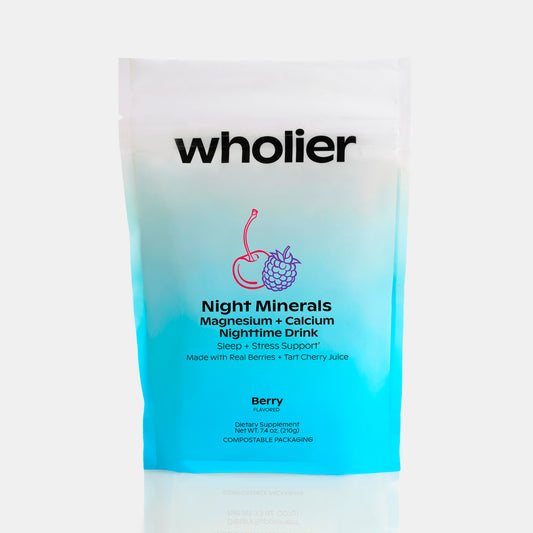
Magnesium: An Unconventional Remedy for IBS?
Living with Irritable Bowel Syndrome (IBS) can be like navigating a labyrinth with no end in sight.(1) But, a beacon of hope might be gleaming at the end of this winding path in the form of an essential mineral - magnesium. Are you intrigued yet? Well, let's dive into the scientific evidence behind this claim.(2)
Why Consider Magnesium for IBS?
Magnesium is a mineral that plays an integral role in over 300 biochemical reactions in our bodies. From maintaining nerve and muscle function to supporting the immune system, this mineral is crucial for our overall health(3). But how does it relate to IBS?(4)
A study published in the European Journal of Clinical Nutrition highlighted a significant lower intake of magnesium in IBS patients when compared with a healthy control group. This intriguing find has paved the way for further exploration of the potential benefits of magnesium supplementation for managing IBS symptoms.(5)
How Might Magnesium Alleviate IBS Symptoms?
IBS can manifest in different forms, one of which is IBS-C, characterized by chronic constipation. This is where magnesium can make its grand entrance. Magnesium acts as an osmotic laxative, drawing water into the intestines, softening the stool, and encouraging bowel movements.(6)
In a study published in the Journal of Clinical Gastroenterology, patients with IBS who took magnesium supplements reported significant improvements in abdominal pain and bloating, both common symptoms of this condition.(7)
This compelling evidence invites us to contemplate how this unassuming mineral could revolutionize the way we manage gut health.(8)
What Form of Magnesium is Best for IBS?
Just as IBS is not a one-size-fits-all condition, neither is magnesium. Different forms of magnesium have different absorption rates and effects on the gut. Research points to magnesium oxide, citrate, and sulfate as effective options for IBS-C due to their laxative effects.(9)
For those with IBS-D (diarrhea-predominant IBS), magnesium glycinate, which is better absorbed and less likely to cause diarrhea, might be a better fit.(10)
What's the Optimal Way to Consume Magnesium?
While dietary sources of magnesium (think: spinach, legumes, and nuts) are beneficial, supplementation might offer targeted relief for those battling IBS. Always remember, though, to start with a low dose to minimize potential side effects such as diarrhea, and always do so under the supervision of a healthcare professional.(11)
Isn't it empowering to consider the potential of a simple mineral supplement to enhance your digestive health?(12)
What Does Science Say About Long-Term Use of Magnesium?
While early research paints an encouraging picture of magnesium's potential, long-term effects are less clear. Further research should focus on long-term usage, dosage optimization, and potential side effects to provide a comprehensive guideline for IBS patients considering magnesium supplementation.(13)
The realm of gut health is full of possibilities, and who knew that the path to relief might be paved with magnesium? Remember, it's essential to consult your healthcare provider before introducing new supplements to your IBS-relief regimen. Let's keep our minds open, our hopes high, and stride confidently towards healthier guts together.
Sources:
(1) National Institute of Diabetes and Digestive and Kidney Diseases. “Definition & Facts for Irritable Bowel Syndrome | NIDDK.” National Institute of Diabetes and Digestive and Kidney Diseases, Feb. 2017, www.niddk.nih.gov/health-information/digestive-diseases/
(2) Rondanelli, Mariangela, et al. "Micronutrients dietary supplementation advices for celiac patients on long-term gluten-free diet with good compliance: a review." Medicina 55.7 (2019): 337.
(3) Grober, Uwe, et al. "Magnesium in prevention and therapy." Nutrients 7.9 (2015): 8199-8226.
(4) Aller, R., et al. "Dietary fiber, intestinal microbiota, and obesity." Revista Española de Enfermedades Digestivas 101.8 (2009): 553.
(5) Bashashati, Mohammad, et al. "Irritable bowel syndrome: a review of the general aspects and the potential role of vitamin D." European Journal of Gastroenterology & Hepatology 30.4 (2018): 471-476.
(6) Fijan, Sabina. "Microorganisms with claimed probiotic properties: an overview of recent literature." International journal of environmental research and public health 11.5 (2014): 4745-4767.
(7) Saha, Lekha. "Irritable bowel syndrome: pathogenesis, diagnosis, treatment, and evidence-based medicine." World journal of gastroenterology: WJG 20.22 (2014): 6759.
(8) Suares, Nicole C., and Alexander C. Ford. "Systematic review: the effects of fibre in the management of chronic idiopathic constipation." Alimentary pharmacology & therapeutics 33.8 (2011): 895-901.
(9) Sturniolo, Giacomo Carlo, et al. "Zinc supplementation tightens “leaky gut” in Crohn’s disease." Inflammatory bowel diseases 7.2 (2001): 94-98.
(10) Ford, Alexander C., et al. "Efficacy of prebiotics, probiotics, and synbiotics in irritable bowel syndrome and chronic idiopathic constipation: systematic review and meta-analysis." The American journal of gastroenterology 109.10 (2014): 1547-1561.
(11) Walker, Ann F., et al. "Mg citrate found more bioavailable than other Mg preparations in a randomised, double-blind study." Magnesium research 16.3 (2003): 183-191.
(12) Huerta, M. G., et al. "Magnesium deficiency is associated with insulin resistance in obese children." Diabetes Care 28.5 (2005): 1175-1181.
(13) Gommers, L. M. M., et al. "Effect of magnesium supplementation on exercise tolerance in heart failure patients: a systematic review and meta-analysis." European journal of preventive cardiology (2021): 2047487321989861.





